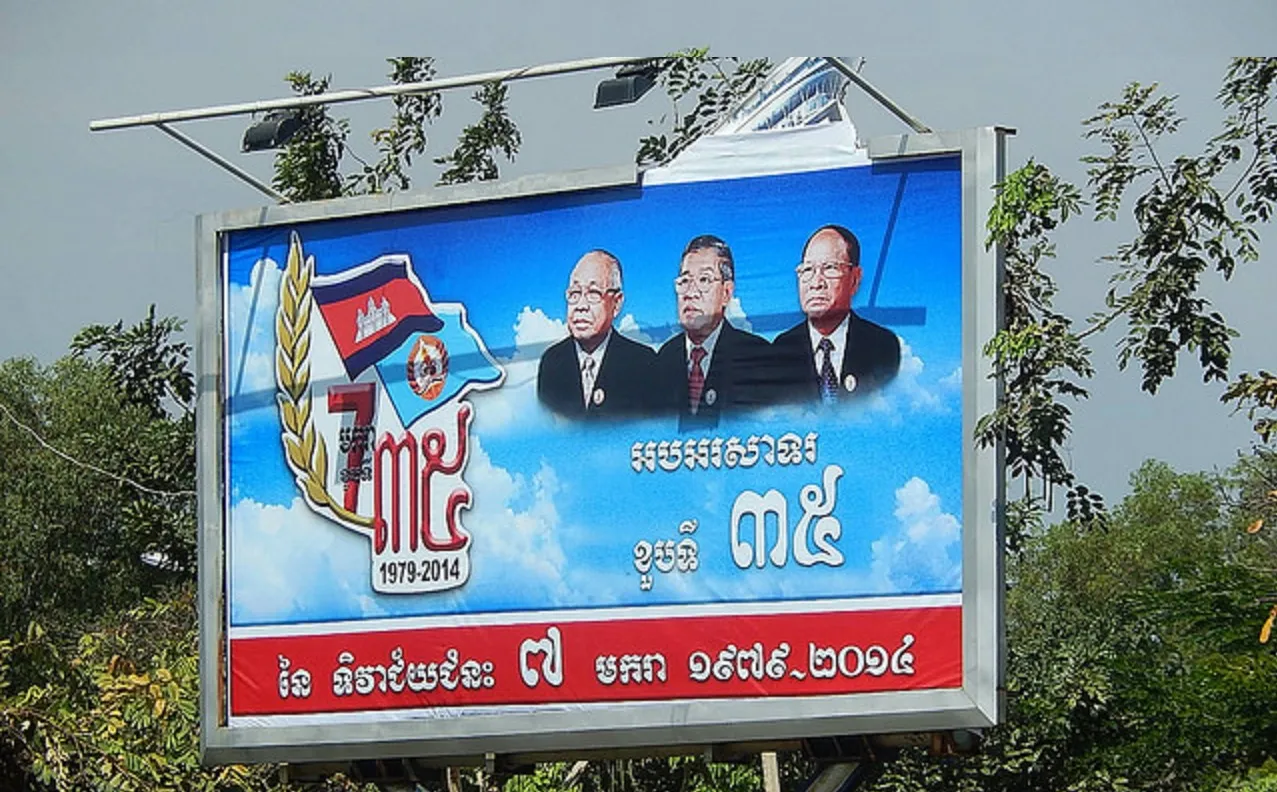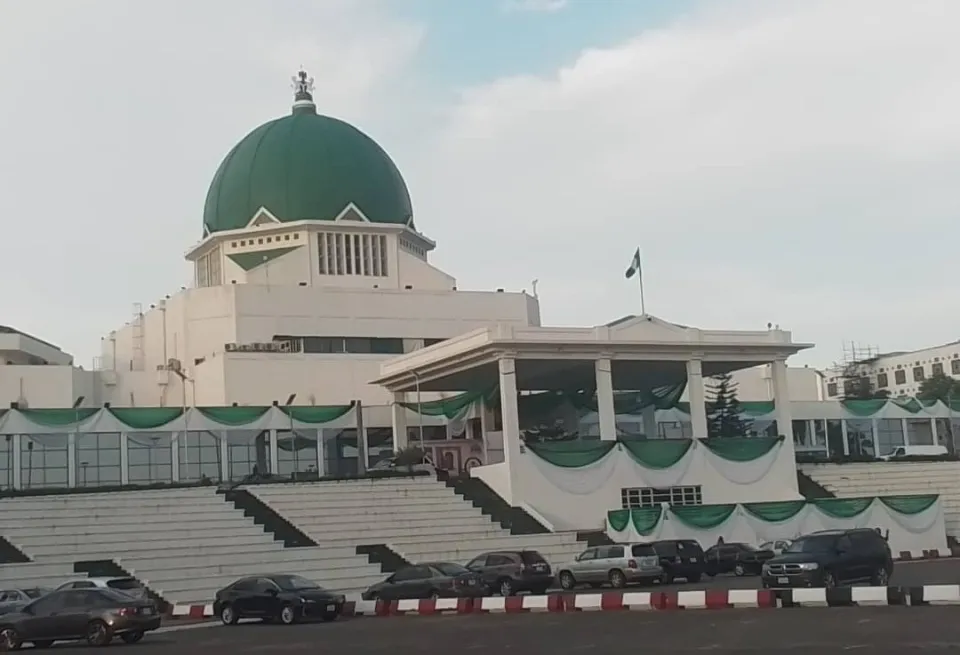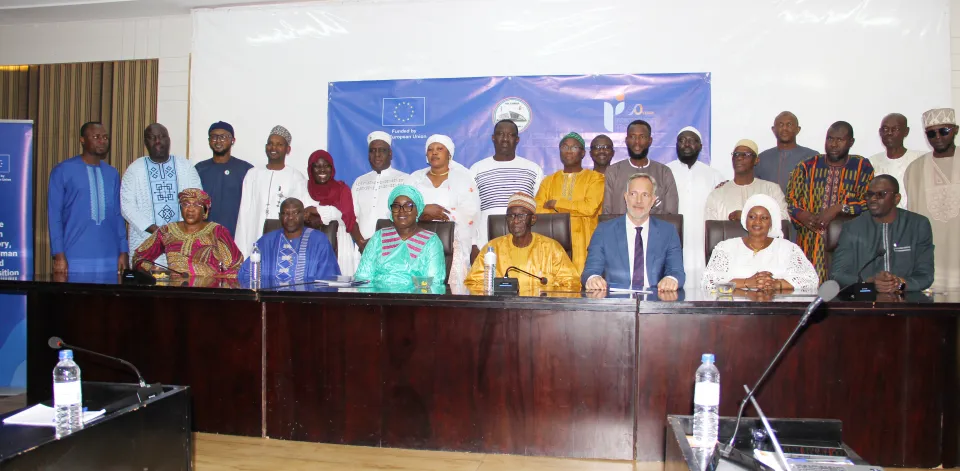Cambodia’s looming democratic decline on the eve of nationwide elections. What gives?

The final front page of The Cambodian Daily read “Descent into Outright Dictatorship”, before ending 24 years and 15 days of independent journalism in the country and being forcibly shut down over state-imposed legal threats over a disputed USD 6.3 million bill in back taxes. This final headline was perhaps symptomatic of the repressive actions of the Hun Sen-led government in Cambodia as it increased its authoritarian grip on the country. Being the longest-serving Prime Minister to date in the world with 33 years at the helm, Prime Minister Hun Sen has shown no intention of giving up power, and instead has announced that he intends to remain in his leadership post for another decade in a speech addressing garment factory workers. In fact, he has gone as far as openly threatening civil war if his party loses the upcoming July 29 elections. With a new round of general elections this week being contested by 20 parties, this article documents the recent wave of authoritarian acts which are negatively impacting electoral competitiveness and fairness as well as freedom of expression.
Crackdown on Political Opposition
On 16 November 2017, the Supreme Court, at the behest of the government, dissolved the Cambodian National Rescue Party (CNRP) the main opposition party. The only two parties that have demonstrated a capacity to mobilise voters in recent Cambodian elections have been the Hun Sen-led Cambodia People’s Party (CPP) and the Cambodian National Rescue Party (CNRP), a coalition of opposition parties. In last elections in 2013, the CPP achieved 48 per cent of the popular vote, while the CNRP achieved 44 per cent. The two-party stranglehold on the Cambodian political scene was further illustrated by the weak performance of other parties in the 2013 general elections, as the next runner-up, the royalist Funcinpec party only won about 3.7 per cent of the vote and failed to win a single seat in the legislature. In the backdrop of increasing gains made by the CNRP after the last round of commune elections in June 2017 (the CPP won 51 per cent of the popular vote while the CNRP won 46 per cent), the government, through the Supreme Court, dissolved the CNRP after its leader Kem Sokha was arrested at midnight on 3 September 2017 by between reportedly 100 to 200 police officials on charges of treason per Article 443 of the Cambodian penal code. His ‘offence’ was to seek political advice from the United States and is based on a video from 2013 broadcasted by the Cambodian Broadcasting Network in Australia in which Kem Sokha reported that he received support and advise from the US regarding political strategy. He currently faces between 15 to 30 years of imprisonment.
The dissolution of the CNRP was complemented with a five-year political ban for 118 members of the CNRP by the same Supreme Court ruling for allegedly conspiring to overthrow the government with the help of the United States. Perhaps even more demonstrative of the government’s authoritarian intentions, the 55 parliamentary seats won by the CNRP in the 2013 general elections have been allocated to smaller parties after the Supreme Court ruling. In addition, the government has cancelled the diplomatic passport of 56 opposition members after the Supreme Court ruling.
Kem Sokha’s arrest mirrored the government’s treatment of Sam Rainsy, the previous leader of the CNRP. In February 2017, Rainsy was forced to resign after the government pushed through amendments through parliament which conferred unto itself the power to dissolve any political party if the leader holds a criminal conviction. Rainsy, in particular, was an obvious target of this amendment, as he was found guilty of defamation charges, was tried in absentia, and has been in self-imposed exile in France since 2015. In addition to the trumped-up charges against Rainsy, local human organization Licadho states that out of the 25 political prisoners that remain behind bars, 18 of them belong to the CNRP, including Ban Somphy, a CNRP district deputy leader, Ismail Pin Osman, a CNRP national election candidate, Um Sam An, a CNRP member of parliament, Khin Chamreun, the CNRP Phnom Penh youth chief, and Oeur Narith, a CNRP public affairs department officer. In response, to the party’s dissolution and banning of its members, leaders of the party, most notably, Rainsy, have publicly called for a boycott of the vote in the upcoming elections, to which Hun Sen responded with an announcement to criminalise individuals who called for a boycott.
The dissolution of the CNRP and the arrest of its leaders demonstrates a judicialised form of authoritarianism by the government. Judicial instruments have been the main political weapon of the Hun Sen-led government, as seen by the history of charges against Sam Rainsy in the last few years. Government has also used the Supreme Court, the security apparatus, and the criminal code to remove opposition politicians from the political scene, which in many ways, is similar to past charges launched against Anwar Ibrahim, the leader of the Pakatan Rakyat opposition alliance in Malaysia, and Aung San Suu Kyi, leader of the National League for Democracy (NLD) in Myanmar.
The severity of this judicialized form of authoritarianism in Cambodia, in a comparison to other multi-party democracies in Southeast Asia can be demonstrated in the two diagrams below using International IDEA’s Global State of Democracy indices: the first indicates the degree of electoral cleanliness in these countries, while the second demonstrates a measurement of the freedom of political parties, across a period between 2000 to 2015. In both these diagrams, Cambodia demonstrates the second worst environment for clean elections and the worst for freedom of political parties.


Crackdown on Media and Civil Society Groups
The closure of The Cambodian Daily in 2017 after being levied with a USD 6.3 million tax bill by the Cambodian authorities (which they had not paid since 2007) remains part of a systematic attempt by the government to check for media organizations and NGOs operating in the country to account for back taxes, and have used (or misused) such administrative regulations as a political weapon to censor opposition dissent against the government and its leaders. In addition to the closure of The Cambodia Daily, last remaining independent paper, The Phnom Penh Post, was bought out by a PR firm (Asia PR) which has connections to both the Cambodian and Malaysian government. The newspaper reported that it had been sold to Malaysian investor Sivakumar Ganapathy, the head of the PR firm, which had previously worked for Hun Sen as a political strategist. Immediately after the takeover, the firm has actively engaged in censoring the works of its own journalists. This censorship includes a report by the newspaper about its own takeover, which led to the firing of the two authors of the article. This has led to a number of resignations (such as CEO Marcus Homles and eight other reporters) and the retrenchment of key staff, including Editor-in-Chief Kay Kimsong. This spate of resignations also includes the newspaper’s Business Editor Brendan O’Byrne, who resigned in protest after being ordered to remove his article about the sale of the newspaper from the website by the new management. The government has also ordered the closure of 21 radio stations that it reported as violating the broadcasting regulations, predominantly focusing on outlets that regularly featured opposition politicians such as the Voice of America and Radio Free Asia (RFA) that are funded by the US government. In particular, the official accusation levied against the RFA was for “not requesting permission to broadcast external programs” and avoiding their tax obligations.
Civil society organizations, including international NGOs, have not been exempt from this wave of repression. On 23 August 2017, the US-based National Democratic Institute (NDI) have been ordered by the Foreign Affairs Ministry to cease operations with immediate effect and expel its foreign staff from Cambodia within seven days. Using similar administrative regulations as observed for the forcible closure of newspapers and radio stations, the government accused the NDI of failing to register with the authorities.
To compound the situation, individual journalists have always been frequent targets for crackdowns, as two RFA journalists Uon Chhin and Yeang Sothearin face up to 15 years in prison for espionage while notable political commentator Kem Ley was allegedly assassinated in 2016 after producing an expose about Hun Sen’s family’s business operations. Certainly, the timing of these closures are suspicious, as they occurred after the gains made by the opposition in the commune elections.
Focusing on media environment in the upcoming elections, the government has increased restrictions on coverage by journalists as the National Election Committee (NEC) issued a new code of conduct that bans journalists from expressing opinion and publishing news that “affects national security” or “causes instability”. Specifically, conducting interviews at polling stations on election day has been declared a criminal offense. In addition, the new code of conduct stipulates regulations that prohibits journalists from asking detailed questions about the election results, from translating their “own ideas into conclusions”, from reporting on news that affects the “political and social stability”, and from expressing “personal opinion or prejudice”. Offenders will be fined 5 million to 30 million riel (USD 1,250 to 7,400) per Article 142 of the Election Law. There are however no clear standards by which reporting would be judged to be criminally offensive.
With regard to the power of social media for providing arena for widespread dissemination of news and discourses during elections, a month prior to the upcoming elections, the Ministry of Interior, Information and Telecommunications have increased its monitoring capacity over social media by creating an inter-ministry working group to monitor social network websites. According to a joint statement by the ministries, the purpose of the inter-ministry group is “to oppose and prevent the broadcast or distribution of information or writing, voice, picture, video and/or other forms which intend to cause chaos for national defense, national security, economic progress, public order, culture and traditions.” 116 civil society groups stated that the ministries have accorded themselves unchecked discretion to censor the content of social media and close accounts, with no judicial oversight or providing for the right to appeal for would-be offenders.
The use of administrative regulations in the recent media crackdown creates a negative precedent against individuals or groups that report on government mismanagement, abuse of power, and other strands of authoritarianism, while the increased capacity of the government to censor such content through ordinances and issuances and strengthened technical capabilities gives the government the means to be able to silence those individuals and groups.
While new elections carry a hope that a Cambodian spring may be on the horizon, with the recent wave of authoritarianism, it does appear that such hopes for a democratic renewal in the country may be bleak. Hun Sen’s pledge to stay in office for another decade appears to be realistic not because of the historical dominance of the CPP in recent elections, but due to the government’s control over the means to extend their stay in power, such as by tilting the electoral playing field to their advantage, prior to elections being run, and by controlling the narratives regarding the CPP and its leaders.




